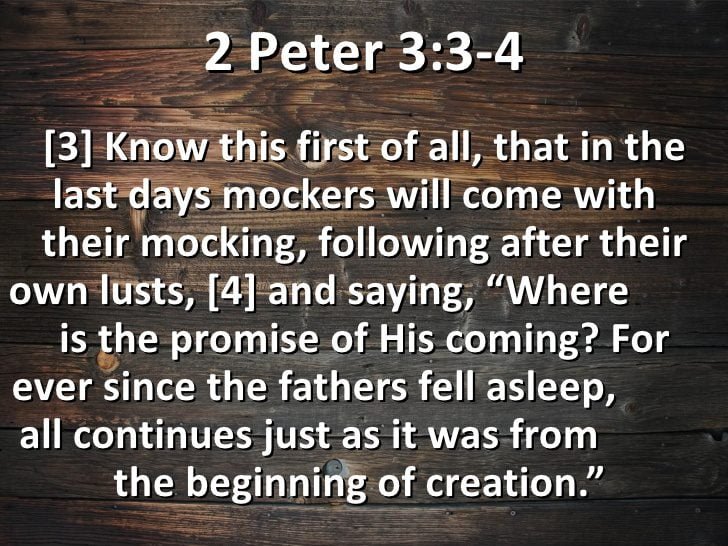
Many Evangelicals believe that Jesus will not return to earth until the gospel is taken to the ends of the earth. This belief is based on several Bible verses, particularly what is commonly called Jesus’ Olivet discourse:
And as he sat upon the mount of Olives, the disciples came unto him privately, saying, Tell us, when shall these things be? and what shall be the sign of thy coming, and of the end of the world? And Jesus answered and said unto them, Take heed that no man deceive you. For many shall come in my name, saying, I am Christ; and shall deceive many. And ye shall hear of wars and rumours of wars: see that ye be not troubled: for all these things must come to pass, but the end is not yet. For nation shall rise against nation, and kingdom against kingdom: and there shall be famines, and pestilences, and earthquakes, in divers places. All these are the beginning of sorrows.Then shall they deliver you up to be afflicted, and shall kill you: and ye shall be hated of all nations for my name’s sake. And then shall many be offended, and shall betray one another, and shall hate one another. And many false prophets shall rise, and shall deceive many. And because iniquity shall abound, the love of many shall wax cold. But he that shall endure unto the end, the same shall be saved. And this gospel of the kingdom shall be preached in all the world for a witness unto all nations; and then shall the end come. (Matthew 24:3-14)
In Matthew 28:19, 20, Jesus tells his disciples — the eleven:
Go ye therefore, and teach all nations, baptizing them in the name of the Father, and of the Son, and of the Holy Ghost: Teaching them to observe all things whatsoever I have commanded you: and, lo, I am with you always, even unto the end of the world. Amen.
As Jesus was getting ready to depart this earthly realm and return to Heaven, he gave his disciples one final command. His disciples asked him, Lord, wilt thou at this time restore again the kingdom to Israel? Jesus replied, It is not for you to know the times or the seasons, which the Father hath put in his own power. And then he said:
But ye shall receive power, after that the Holy Ghost is come upon you: and ye shall be witnesses unto me both in Jerusalem, and in all Judaea, and in Samaria, and unto the uttermost part of the earth.
These verses, as with all Bible verses, can be interpreted many different ways. Some Christian sects believe that these prophetic verses were fulfilled during the lifetime of the apostles. According to their peculiar interpretation, these verses have nothing to do with today. It sure would be nice if Christians treated the entire Bible this way; that it has nothing to do with today. Unfortunately, millions of Evangelicals believe these verses have EVERYTHING to do with today.
Most Evangelicals believe that Jesus will one day return to earth’s atmosphere and rapture every Christian. This catching-up of believers is said to be imminent; meaning that there is nothing prophetically preventing Jesus from returning at this very moment. The date and time of Christ’s return are written in God’s Google Calendar, but no one else knows when that will be. God is the best surprise party planner ever; keeping the rapture’s date and time secret until the moment when Gabriel licks his lips, blows his trumpet, and God #1 says to God #2, go to earth, boy, and get your children. And then, faster than a speeding bullet, the one and only King of Kings and Lord of Lords will, as 1 Thessalonians 4:16 says: descend from heaven with a shout, with the voice of the archangel, and with the trump of God. At that moment:
The dead in Christ shall rise first: Then we which are alive and remain shall be caught up together with them in the clouds, to meet the Lord in the air: and so shall we ever be with the Lord. (I Thessalonians 4:16,17)
Other Evangelicals believe that two things keep Jesus from returning to earth.
First, the Antichrist must be revealed, and second, the gospel must be preached to the ends of the earth. I want to focus the remainder of this post on the necessity of the gospel being preached to everyone before Jesus can return to earth.
I came of age in an era when the fervor of Evangelicals was heightened by the belief that Jesus would return in their lifetime. I heard countless sermons about the rapture, the great tribulation, the second coming of Christ, the millennial reign of Christ on earth, and the great white throne judgment. Preachers would speak of ‘Jesus tarrying’ so more souls could be saved. Such sermons were meant to stir the passion of listeners for lost souls.

Much has happened over the past forty or fifty years. Jesus, of course, did not return to earth as predicted by men such as Jack Van Impe and Hal Lindsey. Evangelicals, thanks to Jerry Falwell, discovered and fell in love with raw political power. Today, instead of winning souls and ushering in the return of Jesus, Evangelicals busy themselves with winning elections, passing right-wing Republican legislation, and doing their part to usher in, not the return of Jesus, but the reign of the antichrist, Donald J. Trump.
One Evangelical collective, however, believes God wants them to win two billion souls before Jesus comes again. Birthed in 2002, the Billion Soul movement is nearing the 1.2 billion hamburgers served, uh, I mean souls saved mark. The goal is to see two billion people converted to Christianity. And make no mistake about it, the Billion Soul movement is a mass conversion movement; the conversion of Muslims, Hindus, Catholics, and other non-Evangelicals to Evangelical Christianity.
The man behind the Billion Soul movement is James O. Davis, the founder of Cutting Edge International and the co-founder of the Global Church Network. In 2010, Davis was named one of the “Top Ten Christian Influencers In The World.” So, Davis must be a “somebody,” but I have never heard of him. For readers who are as clueless as I am about Davis, here’s his brag stats:
His [James O.Davis] leadership includes:
- A biannual Synergize! Pastors Conference, regional Synergize! Leadership Summits, plus the deployment of the Global Church Leadership
- Summits in all major world regions. During international summits in 2007-2011, leaders committed to plant more than five million new churches.
- An annual North American Conference On Biblical Preaching.
- More than 80,000 pastors have attended these conferences and summits.
- Before launching the Global Church Network, Dr. Davis served twelve years as the National Evangelists Representative for the National Assemblies of God world headquarters where he provided leadership for some 1,500 evangelists and equipped thousands of students for full-time evangelism.
- Ministering more than 45 weeks per year to an average yearly audience of more than 125,000 people. In the last forty years, Dr. Davis has ministered face-to-face to more than 7,000,000 people in more than 121 nations.
- Annual travel exceeding 250,000 miles with a combined total of nearly 9,000,000 miles.
The engine that drives the Billion Soul movement is the 500,000 pastors that have said YES to being a Billion Soul church. What exactly is a Billion Soul church, you ask? The movement’s website says a Billion Soul church:
- Is a Synergizing Church that networks and partners with others to complete the Great Commission.
- Is a Soul-Saving Church with a focus of doubling in size within ten to fifteen years.
- Is a Seeking Church that prays for the Great Commission to be fulfilled.
- Is a Sending Church that trains ministers to send into the harvest field and plants churches.
- Is a Sowing Church that invests resources and finances in the Billion Soul Movement.
Of course, most of this soul-saving is going on outside of the United States, Europe, and Australia. Western countries have been thoroughly picked over by evangelizing vultures, so it is on Africa and Asia to find new suckers to fleece and “save.” And therein lies one the biggest problems I have with Evangelicalism — the pathological need to evangelize non-Evangelical cultures. Non-Christian countries are considered inferior. Their cultures and religions are worthless when compared to Christianity. Instead of respecting the beliefs and practices of other cultures, evangelizing Evangelicals hope to replace these beliefs and practices with Western Christianity. Evangelicals see non-Christian cultures as blind and deaf to truth; the truth being that the only road to Heaven is paved with the blood of Jesus, and the only way to escape hellfire and damnation is to disavow false gods and, by faith, accept Jesus as your Lord and Savior. Imagine, for a moment, Hindu missionaries fanning out across the United States intent on delivering Christians from their ignorant ways. Imagine these zealots trashing your culture, beliefs, and practices, saying that the way to life, peace, and eternal rewards is the Hindi way. Would American Christians be offended? How dare these people look down on us and denigrate the Red, White, and Blue, millions of Billy Bobs and Suzie Jeans would say. Leave us alone! We have a right to worship our God in peace, without being bothered and harassed by Hindu missionaries. Exactly. Why, then, do Evangelicals believe they are exempt from such common courtesies?
Evangelicals, of course, believe God has commissioned them (see aforementioned verses) to bug, harass, irritate, annoy, agitate, and torment non-believers. Invited or not, zealous Evangelicals shove Salvation Shit Sandwiches® in our faces, thinking that they are doing us a favor by “sharing” with us the “truth.” We should be very glad that most Evangelicals aren’t zealots. Most of them, in fact, are passive church attendees who are content to let the world go to Hell. Now, take away their padded seats, air conditioning, and soft toilet paper in church bathrooms, then you’ll see people on fire for Jesus. Let their “felt” needs go unmet, and they will be lining up a voting block to oust the pastor. I live within thirty minutes of more than one hundred churches, yet in the fifteen years I have lived in Ney, Ohio, not one Christian has ever knocked on my door and attempted to evangelize me or invite me to church. The Jehovah’s Witnesses stop every year or two, but no one else. If winning souls for Jesus is what it is all about, why do most Evangelicals NEVER, EVER share their faith? If this life is really all about preparation for the life to come, why does it seem that most Christians are in no hurry to leave planet earth? For all their talk of about salvation, death, and the life to come, Evangelicals seem to be quite content with the here and now. They speak of being ready to go; they just don’t want to be on the next train. If life after death is all that Evangelicals say it is, why do they do all they can to keep from dying? If Heaven is “a wonderful place, filled with glory and grace,” why not let cancer have its way and give up on life? From my seat in the atheist pew, all I see are Christians who are very much in love with life and who are in no hurry to become worm food.
The next time you stumble into an Evangelical church for anything other than a funeral or wedding, pay attention to what everyone is talking about before and after the service. I guarantee you will hear very little chatter about winning a billion souls to Christ. Instead, those who worship the name above every name, Jesus, will be happily talking about family, grandchildren, sports, their latest vacation, and what they plan to eat for lunch. In other words, life. And that’s a good thing. As long as Evangelicals are busy talking about Ohio State, deer season, high school football, crocheting, cat videos, and the Blizzard of ’78, they are not focused on attempting to make you and me numbers 855,552,200 and 855,552,201 on the saved list. THAT, is good news, indeed.
For your entertainment:
Bruce Gerencser, 66, lives in rural Northwest Ohio with his wife of 45 years. He and his wife have six grown children and thirteen grandchildren. Bruce pastored Evangelical churches for twenty-five years in Ohio, Texas, and Michigan. Bruce left the ministry in 2005, and in 2008 he left Christianity. Bruce is now a humanist and an atheist.
Connect with me on social media:
Your comments are welcome and appreciated. All first-time comments are moderated. Please read the commenting rules before commenting.
You can email Bruce via the Contact Form.




